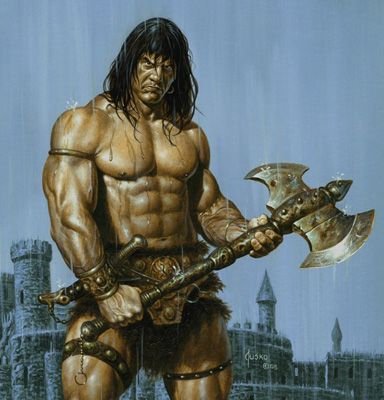Few people know, but the character Conan, known worldwide for a loooooong comic series (the first story was written in 1952) and three films (one a remake), is actually a literary character, created in the 1930's by writer Robert E Howard, who helped shape the "heroic fantasy" style that would later be used by many other writers in many other fantastic sagas.

Howard wrote 19 stories telling the adventures of the Cimmerian warrior, in all his phases: barbarian, mercenary, pirate and, finally, king. And I am writing this text precisely because I just read a compilation with some of these short stories.
The fantasy universe created by Howard for his character Conan is vast and extremely detailed. Filled with the history of ancient civilizations, with its wars and alliances, its sciences and witchcraft, it presents to the readers a high level of detail of the customs, habits and traditions of these civilizations. As in Tolkien, Lewis, and others (more recently George Lucas and George Martin, for example), the historical facts invented have a complete connection to each other, as well as to the time line that has been established and the behavior of the societies involved; that is, you can hardly find gaps or inconsistencies, and you are invited to really enter into fantasy and unleash the imagination, plunging into the bowels of that world and becoming enchanted with it.
And the most interesting of these universes is that they boil archetypes !! The princess who wants to be saved, the wizards and their connections with the unknown, the good-hearted mercenary, the relentless warrior who comes from the ravished female, hybrid monsters of a human / beastly nature. Conan himself is, throughout his life, a representation of several of these archetypes.
There is even a certain resemblance between Howard and Lovecraft. Both were masters at imagining creatures of nightmares, distorted on a level far beyond the physical and whose existence is a violence against nature; creatures that lead to madness and despair those who contemplate them. Like Lovecraft, Howard's narrative often becomes dark, and hope always abandons the character pursued by some unspeakable horror, trapped in the catacombs of some ancient and abandoned city. Hopelessness that, by the mastery of the artist, we, readers, also feel.